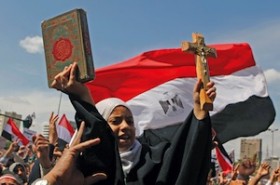 Religious groups stake out a wider role in violent conflicts.
Religious groups stake out a wider role in violent conflicts.
On Sept. 11, 2001, a cadre of young Muslim men hijacked planes and, perhaps with visions of black-eyed virgins in Paradise, crashed them into the Pentagon and the twin towers of the World Trade Center, acting supposedly in the name of their religion. Within hours of these atrocities, Top 40 radio stations across the United States began playing John Lennon’s anthem “Imagine,” which supplied what many saw as a soundtrack of hope and harmony in the aftermath of the terrorist attacks. The lyrics longingly envisioned “all the people, living life in peace.” But with a disquieting relevance to the suicide attacks, Lennon had also pondered, “Imagine there’s no heaven…and no religion, too.”
Since then commentators have fleshed out this contemplation of a religion-free world. “Imagine no suicide bombers, no 9/11…no Crusades…no Israel/Palestine wars…no Taliban,” wrote the prominent atheist and evolutionary biologist Richard Dawkins five years after the towers crumbled. This past December, 30 years after the ex-Beatle was gunned down by a deranged fan, the comedian and television personality Bill Maher, alluding to religious strife in general, sent a message to his fans on Twitter: “Remember Lennon said ‘Imagine NO religion.’ Honor what he wrote—it holds up.” These and other secularist screeds have tapped into a larger feeling that religion usually is a cause of violence rather than an agent of peace helping to resolve and heal conflicts. …read more





